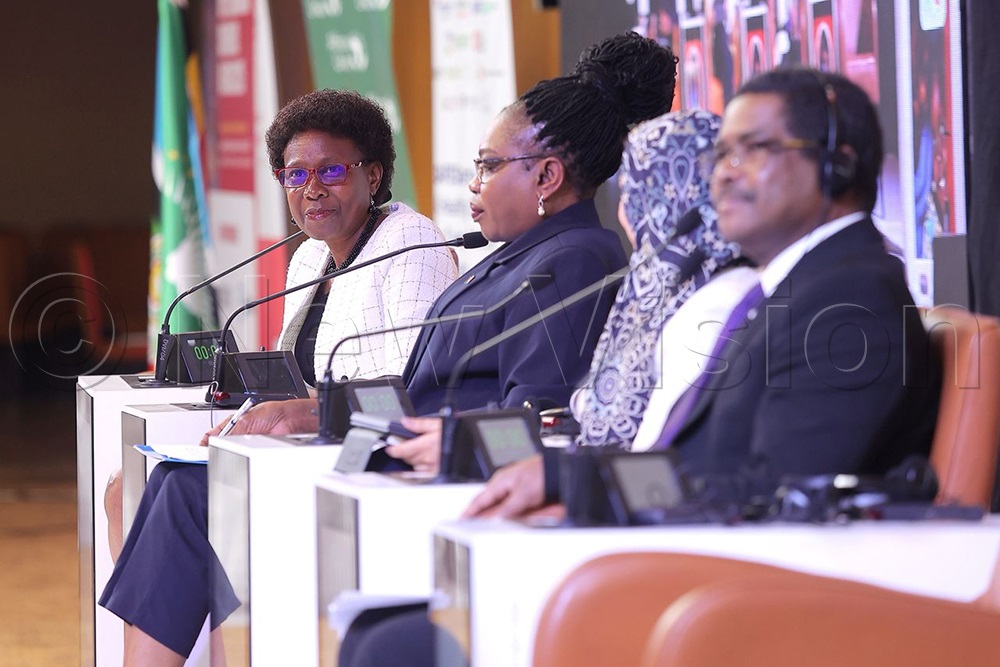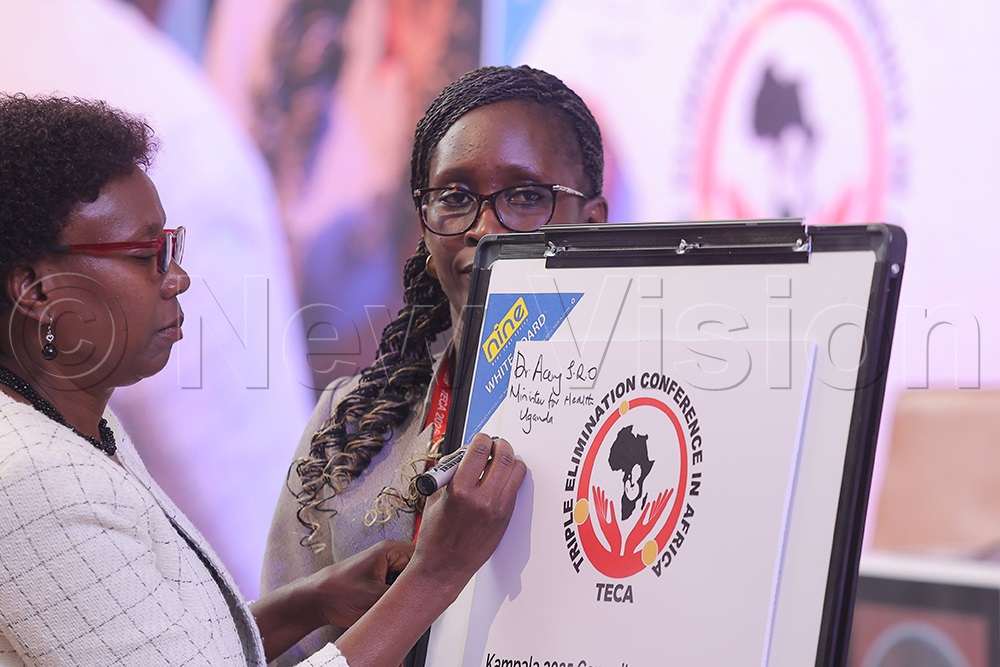African health ministers urged on triple elimination target by 2030
Aceng said the continent must “galvanise urgent actions for securing high-level political commitment to address systemic gaps in the prevention, diagnosis and treatment of HIV, hepatitis B and syphilis.”
Health minister, Dr Jane Ruth Aceng (White dress in centre) posing for a group photo with some of the delegates pose for a photo after the conference. (Credit: John Musenze)
________________
Health ministers and stakeholders from across Africa have urged to commit to urgently prioritise efforts to eliminate mother-to-child transmission of HIV, syphilis and hepatitis B by 2030.
The call by Uganda’s health minister, Dr Jane Ruth Aceng, was during the closure of the high-level ministerial conference on triple elimination held in Uganda's capital, Kampala, from July 21 to 23, 2025.
“This call to action spells out unifying actions, transforming futures and achieving triple elimination in Africa by 2030,” Aceng said, emphasising the urgency for countries to adopt evidence-based interventions and scale up existing programmes.
Minister of Health, Dr Jane Ruth Aceng speaking to delegates. (Credit: John Musenze)
Addressing ministers, civil society and development partners, Aceng said the continent must “galvanise urgent actions for securing high-level political commitment to address systemic gaps in the prevention, diagnosis and treatment of HIV, hepatitis B and syphilis.”
She noted that vertical transmission (mother-to-child) remains a significant public health challenge that “undermines the rights and well-being of women, children, and families”.
The call to action urged all African Union member states to adopt costed national plans with clear timelines, ensure at least 95% of pregnant women receive timely antenatal care, including provider-initiated testing, and ensure all newborns are vaccinated against hepatitis B within 24 hours of birth.
“There are effective, feasible, and cost-effective interventions to prevent these infections,” Aceng said. “By fully implementing them, we can eliminate vertical transmission as a public health threat.”
She also underscored the need for sustained political leadership and domestic financing, saying, “We must maintain uninterrupted national supplies of diagnostics, medications, and vaccines and ensure integration of elimination services within maternal and child health programmes.”
Aceng called on the African Union Commission, Africa CDC, and development partners to support member states in capacity building, funding, surveillance systems, and community engagement.
“Let us work together: Governments, civil society, and communities to keep our mothers alive and free our children from these infections. The future of Africa’s health depends on our actions today,” she noted.

Minister of Health, Dr Jane Ruth Aceng signing on the call to action. (Credit: John Musenze)
Commendable reputation
Dr Kasonde Mwinga, WHO Country Representative to Uganda, commended the Government of Uganda for hosting the event and recognised its long-standing role in the fight against HIV and other infectious diseases.
“Uganda has long held a commendable reputation in leading by example, particularly in the fight against HIV/AIDS and disease outbreaks,” she said. “We continue to look up to Uganda for inspiration and guidance.”
Kasonde reminded delegates that child survival must remain a top priority.
“We are witnessing far too many preventable infections, congenital conditions and premature deaths. From this conference, we must act decisively and urgently.”
She stressed that the tools to eliminate vertical transmission already exist—from diagnostics and prevention technologies to certification systems—and must be deployed “systematically and intentionally” across all countries.
“The 2030 target is still within reach if we act now,” she said, adding that empowered communities are central to success. Drawing on the example of the Onchocerciasis Control Programme, she noted, “History has shown that when equipped with knowledge and resources, communities become powerful agents of change.”
Kasonde called for bold action: “Together, we can and must eliminate HIV, hepatitis B and syphilis—for our children, our communities, and our continent.”
Dr Stavia Turyahabwe, Uganda’s assistant commissioner for TB and leprosy control, also called for urgent, concrete actions at every level of maternal and child healthcare to prevent infections in newborns.
“Whoever is born must be born free of HIV, hepatitis and syphilis.”
She emphasised the importance of timely interventions: “Within 24 hours, a child must receive the birth dose of the hepatitis B vaccine. These are actions we must prioritise in labour wards, postnatal units, and immunisation clinics.”
Turyahabwe also highlighted the need to prevent infections before pregnancy.
“We must ensure at-risk populations remain free of these diseases long before conception. Let us all take action in our respective capacities. We must invest. The time is now.”